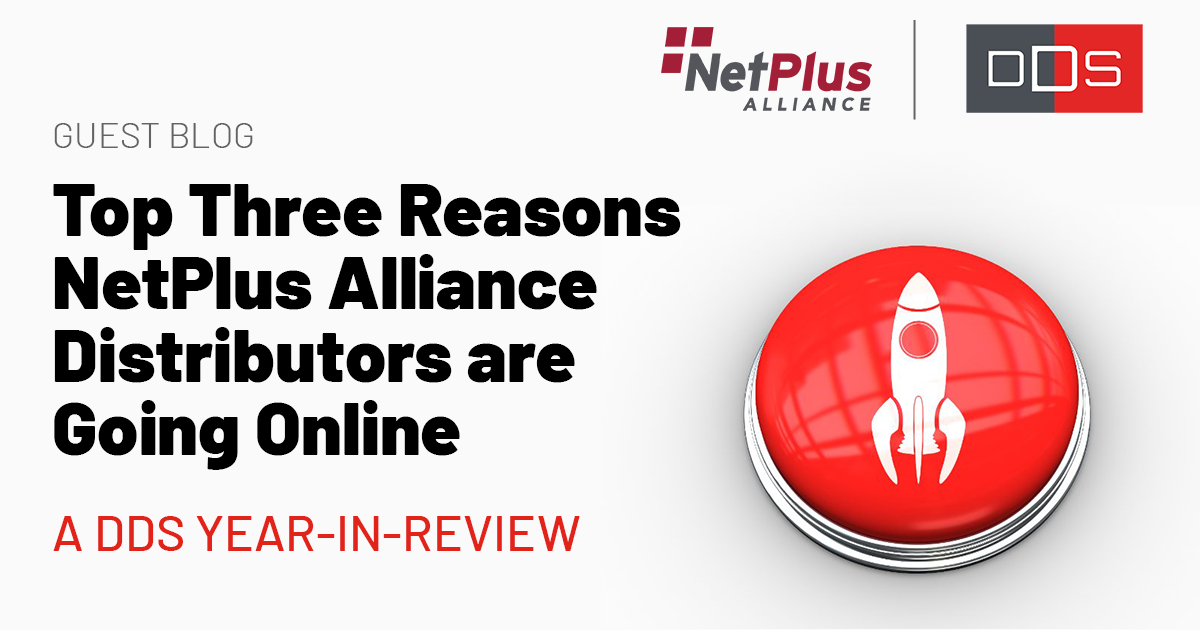Top Three Reasons NetPlus Distributors are Going Online

Jenny Christensen
October 17, 2022
It’s been a little over a year since DDS first engaged with NetPlus Alliance as a Preferred Supplier Partner. In that time, we’ve enjoyed speaking with many NetPlus members and attending multiple events, during which we’ve learned a lot about the group’s goals and challenges around e-commerce.
As a sort of milestone report, we thought we would share some of our findings, along with additional insight from working with hundreds of distributors and manufacturers—both specific to Industrial Supply and from other related wholesale verticals—in an effort to help NetPlus members understand where their peers, and the industry at large, stand with respect to B2B e-commerce.
That said, here are the top three reasons NetPlus distributors have shared as to why they are choosing to enter the online marketplace:
1. Transfer and stewardship of product knowledge.
An aging workforce across the wholesale distribution industry in general means companies are scrambling to hire and train new staff, and—adding to the HR challenge in itself—as these long-time staffers leave, so do their decades of product and industry knowledge.
This has proven a significant obstacle for many companies in trying to transfer product knowledge—which has always been (and will always be) a critical piece of the value-add pie for wholesalers—to newer personnel.
The good news is, as many web-savvy distributors have found, one of the most overlooked benefits of having an e-commerce site is that it not only helps their end-user customers with their product research, but it’s also an invaluable sales enablement tool.
Distributors have long relied on manufacturer product content, whether in the form of glossy brochures in the “catalog rooms” of the past, or as part of extensive training events and modules, to assist everyone from architects and engineers to end-user customers in specifying the right products for their needs.
But as the industry has digitized, manufacturers have changed the way they make product information available to their channel. As former distributors ourselves, we remember watching much of that glossy brochureware start to be published digitally, albeit typically on each vendor’s website. (It’s still common—and a little frustrating—to see a salesperson’s monitor covered in browser windows, each on a different manufacturer’s website, as they try to gather product detail for a given project or quote. No doubt this is neither an efficient nor convenient experience for your team.)
The reality is, with sales teams spread out over multiple branch locations, and fewer in-person product training events and opportunities in general, the digitization and exchange of product data has become critical in ensuring distributors can continue offering the product knowledge and expertise that is so critical to the myriad industry professionals they serve.
This is an area where distributors are learning that e-commerce can really fill an important gap.
There are also more types of product information, in an astounding variety of formats, that can be made available through webstores and digital applications. Well beyond what can (or needs to) fit in your ERP system, there are technical drawings, application and installation details, product videos, 360-degree and 3D product “spins” that help visitors more accurately identify the right products—and which can help reduce costly ordering errors by as much as 40%—and countless other valuable media.
Much of this content can assist users long after the sale of the product, like maintenance manuals (and videos, etc.) and warranty information. As a matter of fact, according to E-Commerce Nation, 45% of shoppers would return to a website that has videos, and a whopping 93% of shoppers say videos are useful after purchase, which means more time on your site.
And what about specialized products that don’t lend themselves well to “simple” product listings? From commodity items to generic products like wire and cable, fasteners, or industrial gases, digital content offers solutions for items that in the past could only ever be listed with, “Call for detail and pricing.”
In addition to our principal product content delivery solution, DDS is proud to be helping many distributors with just this kind of complex or otherwise “unorthodox” product need, creating digital content to add custom items to both their webstore and basic ERP inventory.
2. Relevance and value to the industry.
Again, we’re definitely seeing more and more distributors realizing that having complete and accurate product information on their own websites (and other digital applications) is key in allowing them to remain as relevant and valuable as possible to everyone in the industry ‘ecosystem’—including and especially to their manufacturers, whose products they sell and support.
In fact, another trend we’re seeing is that manufacturers are recognizing the additional value and opportunities available with their distribution partners that have more advanced e-commerce and digital offerings.
For starters, it’s worth noting that manufacturers absolutely want (or expect) their products to be displayed correctly and consistently across their distributor partners’ sites. (Like their more tech-forward distributors, they know they risk losing sales—both online and through traditional channels—when their products are not displayed “as intended” on the digital shelf.) But while suppliers in general have remained relatively patient with distributors’ slow e-commerce adoption so far, they know this is the direction things are going and are starting to favor, reward, and even invest in partners who are getting it right.
Case in point, in addition to the more “standard” types of product content typically displayed online, we’re starting to see manufacturers push more marketing-heavy content, such as promotional web banners and accessory/up-sell item data, to be included on partner sites, which can improve SEO and of course drive sales. Manufacturers really appreciate distributors who are adding featured landing pages dedicated to their brand(s). They are similarly impressed with those partners who can offer configurable item ordering through webstore platforms equipped to accommodate this functionality (we can recommend a few such platforms).
All said, these value-add services, especially around product knowledge and expertise, have long been a crucial part of the role distributors play in the industry, and collectively it’s something that the Amazons of the world will never be able to replicate.
3. The Amazon effect.
Speaking of Amazon, most distributors recognize they stand to lose significant market share from large online retailers who offer thorough and media-rich product information in a user-friendly interface (at any hour of the day and without having to enlist a sales rep), plus an easy shopping experience. For some types of products, this is simply the preferred method of many of your customers for procuring materials—whether you know it yet or not.
The most successful online distributors have wisely tapped into some of the more strategic aspects of the B2C experience, like making sure to choose a webstore platform with quick-order/re-order list functionality for ultra-convenient repetitive ordering.
Though there has been slower adoption on the B2B side, distributors are seeing more and more interest and demand from their customers to have better product information online. This includes inventory availability. Whether your customer ends up placing the order online or via phone into their sales rep—and they will absolutely do both; this is another overlooked part of your webstore’s potential value—if you can solve this problem for them (that is, provide all your manufacturers’ product content in one place, via a more efficient, uniform and pleasant online experience), they will continue to do business with you because you’re making their life easier—often where others cannot.
A lot of distributors are also aware—many having wisely polled their customers—that they are similarly losing sales to the likes of MSC, Fastenal and Grainger, in large part because they don’t have a site (or as effective a site) as these “big guys” do. But, as many distributors we talk to are surprised to find out, when it comes to e-commerce, size really doesn’t matter (yeah, we said it).
All kidding aside, you don’t have to be the biggest distributor (with the deepest pockets) to have a successful web presence; if you’re working with the right partners—to ensure you’re covering the 3 C’s of “Commerce, Content and Connectivity”—you can offer a world-class webstore, featuring the best content available from your manufacturers and supported by a sound marketing strategy, that will rival the likes of the big-name sellers.
In conclusion, NetPlus Alliance members are among the many wholesale distributors who understand that opportunities around e-commerce and digital product content are huge, and only growing. The good news is, they don’t have to reinvent the wheel; many of their peers are experiencing success online, and there are proven platforms and processes ready to help others do the same.
One parting piece of advice? The sooner you start, the better.
